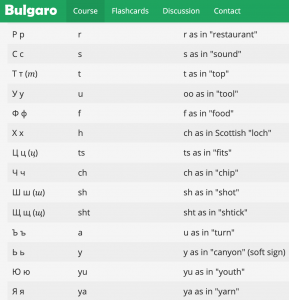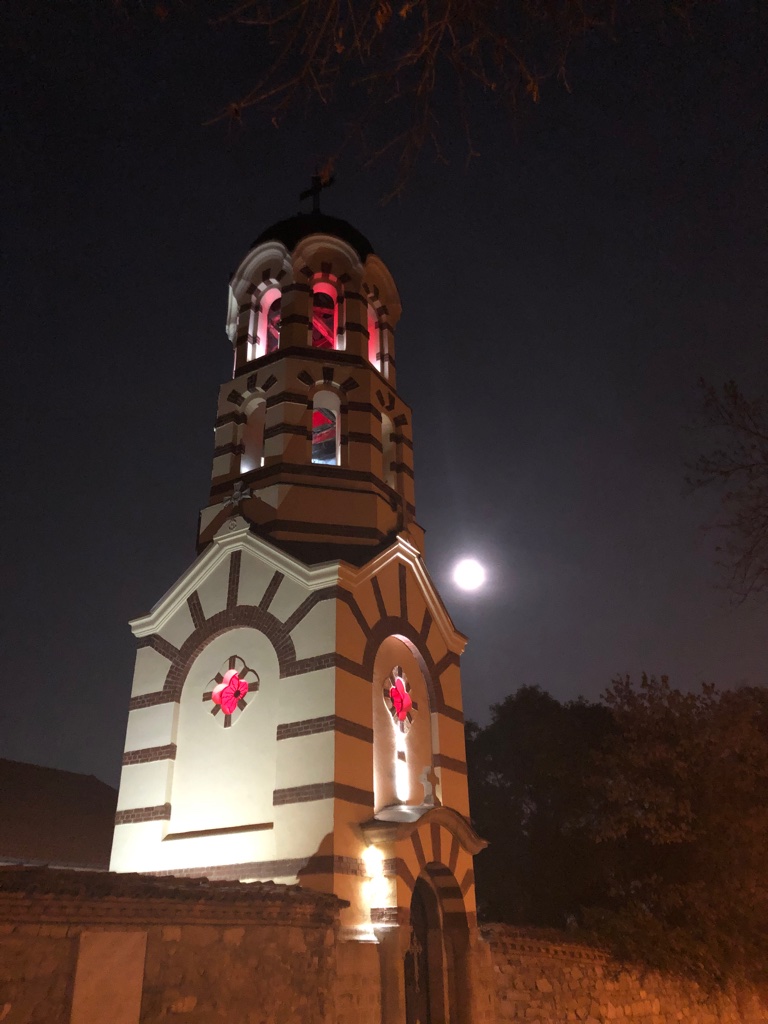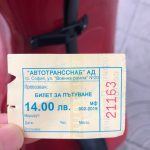I’m in Bulgaria, and I cannot speak or read the language. Over the summer I went to Brazil and I did pretty well learning a bit of Portuguese. In the end I could understand some and say some and that made it really fun and quite navigable.
In the airport before travelling to Bulgaria, far too late, I had a look for a Duolingo type programme and found this one, which helpfully gives you an intro to the alphabet as a first task and I was overloaded. I had thought I could pick up a few phrases to speak and read. Have a look – and this is only half of the letters. You’ll see there are not only different, but also completely new sounds for an English speaker:

Simple things in everyday life bamboozled me. Getting a bus ticket. At the kiosk I handed over some cash, got a little piece of paper and a couple of minutes later meekly returned to the lady to ask, “where?” with hand gestures and the hope that she would reply. She said: SIX. (go to bus stop number 6) See if you could have guessed…
How many stops there were to the destination? One person said three and another said one. The website showed one, but then the bus stopped at a normal bus stop on the side of the road, not a station, so guesswork reigned. I wrote the description of the destination down in English, (with Latin lettering) – not Cyrillic. I wasn’t particularly worried, but I had no clue what was happening and no real way to ask.
This language barrier is no fault of the people here. There is no reason they should speak another language, but I should have studied their language. I can get from here to there by following shapes of roads on a map and yes, the magic of modern translators (for menus) is unprecidented. If I went grocery shopping I would be relying on familiarity and certainly would not buy any cleaning products or medicines. I would have no clue. In restaurants menus tend to have words, not pictures. PICTURES. That’s why Denny’s in America can serve anyone across the country. They use pictures and you don’t have to read.
I am just so glad that I can read and write in my own language. Here I gave my lovely host at the Arts Academy here a piece of paper to write some names of places and things on it, and she wrote them so I could read – I had to ask her to write them so she could read, so if I show to someone else, they will know.
I am really at the mercy of those around me and find myself looking at expressions, listening, and more listening, feeling myself mimic the sounds by making them discretely inside my mouth – baby learning. I’m doing baby learning. I cannot read, write, or speak the language: I am illiterate. Traversing geography has allowed me to experience this in a sudden and real way, and I am now aware of just how big a jump it would be to learn to read as an adult. That cannot be understated.
Makes the stories in the Horton & Freire book all the more meaningful, giving people agency and motivation and support. Hats off to those who help others learn.



@laura Yes, at least getting a writing system right can be helpful. I am happy to learn to read and write cyrillic when I was a kid (due to communist oppression in my home country), but I enjoyed learning the letters of the beautiful Armenian alphabet when I was there. Fortunately only few signs are enough to recognize street names for a start.
Love it! If I were there, hopefully the hand gestures I would have to rely on wouldn’t be offensive. I would just stand there with a huge question on my face and a shrug, hand open in supplication! I cannot imagine the difficulty of even a room number! Keep on going..maybe there’ll be a minor breakthrough before you leave! Good wishes!
A beautiful realization!